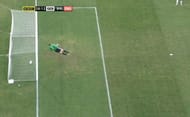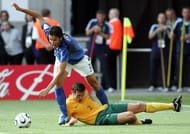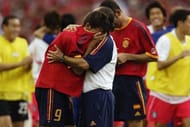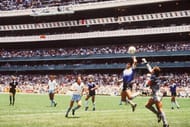Football is one of the last few sports to embrace technology in making on-field decisions. Purists have forever bemoaned the delays in decision-making that disturb the flow of the game and that argument alone has acted as a barrier in introducing technology to help referees and linesmen.
Goal Line Technology was the first step in addressing refereeing errors and it proved to be a very valuable tool thanks to its efficiency and quick response.
However, VAR (Video Assistant Referee) is slowly gaining acceptance in top leagues across Europe. Bundesliga and Serie A have already started employing VARs and it's only a matter of time before it makes its way to top leagues and international matches.
So what if VAR was available back in the day? What goals and results would we have seen? We analyse five goals and the scenarios we could have seen as a result of goals being disallowed.
#5 Frank Lampard's disallowed goal: England vs Germany (2010)

The 2010 World Cup had one major talking point that eventually reignited the debate on using devices to make decisions. Germany met England in the quarter-finals that year and the game saw Die Mannschaft take a 2-0 lead with Miroslav Klose and Lukas Podolski scoring within half an hour.
However, Matthew Upson led the Three Lions' fightback with a goal before England midfielder Frank Lampard took a shot from distance that hit the underside of the bar, bounced inside the goal, and then popped out.
Manuel Neuer was well and truly beaten. He had watched the ball bounce inside the goal but quickly collected the ball and booted it up field before the referee and the linesman had a chance to adjudicate.
Lampard was already celebrating the equaliser before he saw the referee ignore his teammates clamouring for the goal to be awarded. Even coach Fabio Capello was quietly celebrating till he saw to his horror that the goal wasn't awarded.

It would have been the perfect goal to lift up their spirits and provide fans with a scintillating second half. Instead, England were left broken and went on to lose 4-0 with Thomas Muller grabbing a brace to knock the 'Golden Generation' out of the World Cup.
"It is obvious that after the experience so far in this World Cup it would be a nonsense to not reopen the file of technology at the business meeting of the International FA Board in July.
"We will naturally take on board the discussion on technology." - Ex-FIFA president Sepp Blatter
Goal Line Technology was still an untested and unproven concept in 2010. But VAR would definitely have ruled in England's favour.
#4 Fabio Grosso's dive: Italy vs Australia (2006)

Had VAR been introduced a decade or so ago, it may have actually prevented Italy from lifting the 2006 World Cup. Yes, one of the World Cup's most shocking decisions saw the Azzurri benefit at the expense of a heroic Australian team.
It was the Round of 16 where Italy faced the Socceroos who were at the time coached by Guus Hiddink - the man who had overseen South Korea's progress to the semi-final in the previous edition.
It was a tight game with the Australian rearguard giving Italy no quarter. Italy had been reduced to 10 men after Marco Materazzi had been sent off while Luca Toni and Alessandro Del Piero just couldn't find a way through.
By the end of the game, Italy were struggling and Australia looked the stronger team as extra-time loomed. However, disaster struck for Australia in stoppage time.
Italy left-back Fabio Grosso found some space on the left and first made his way past Marco Bresciano before Lucas Neill attempted to stop him by extending his leg and falling to the ground.
“I felt the contact so I went down. Therefore, I say again, I didn’t initiate it … it’s true that I felt the touch and didn’t have the strength to go forward." - Fabio Grosso
Neill missed, but Grosso left a trailing leg before clumsily falling over. The Spanish referee Luis Medina Cantalejo pointed to the spot and substitute Francesco Totti put it away the penalty which was effectively the final kick of the game.
Had Australia taken the game to extra-time, Hiddink would have ensured a tiring Italy suffered thanks to their numerical advantage.
The Socceroos were far more resilient in that game but were undone by a penalty call that VAR would have definitely overruled after numerous replays.
#3 Thierry Henry's handball: France vs Republic of Ireland (2010 playoff)

While this incident did not actually take place at the World Cup, it did decide who would actually go through to the main event in South Africa. When France and Republic of Ireland failed to qualify automatically, they were drawn against each other and it could have gone either way.
France won the first leg 1-0 from a Nicolas Anelka goal before Robbie Keane scored in the return leg to make it 1-1 after 90 minutes. And it was in extra-time, specifically the 103rd minute, when Thierry Henry became the most hated man in Ireland.
After Les Bleus won a free-kick, Florent Malouda in a ball that beat everyone except Henry at the far post. In truth it had beaten him too but the French striker stuck his hand out and prevented a goal kick before crossing the ball to William Gallas who headed home from point-blank range.
As France celebrated Ireland's players remonstrated as one, pointing to their hand. The linesman did not react and the referee allowed the goal to stand, sparking furious reactions from the players and the away fans at the Stade de France.
What made them even more enraged was the fact that Henry celebrated what was clearly an illegitimate goal.
“I will be honest, it was a handball. But I’m not the ref. I played it, the ref allowed it. That’s a question you should ask him.” - Thierry Henry
“I think it was quite blatant that he cheated. The linesman was in line with the incident, it wasn’t even a hard decision to make.” - Ireland defender Richard Dunne
Had VAR been used, replays would have clearly showed Henry sticking out his left hand to control the ball before quickly lobbing it past goalkeeper Shay Given.
“I would prefer to go out on penalties than this. I am sad because the referee had the time to ask the linesman and Henry." - Ireland manager Giovanni Trapattoni
It was injustice of the highest order, denying a team on the rise a chance to cement their place in what would have been their fourth World Cup.
Karma had other plans for France, though. After qualifying for the World Cup, they crashed out in the group stages without a win - finishing last in a group which had Uruguay, Mexico, and hosts South Africa (who beat Les Bleus in the final group game in only their third World Cup).
#2 Fernando Morientes' disallowed goal: Spain vs South Korea (2002)

The 2002 World Cup was a tournament of many firsts. It was the first time the quadrennial tournament was being held in Asia as Korea and Japan co-hosted it. It was also the first time an Asian team reached the semi-finals - thanks to some questionable officiating.
Spain met South Korea in the quarter-final after a controversial result saw the Asian side beat Italy in extra-time in the Round of 16 with Italian suggesting a conspiracy to eliminate the Azzurri. The quarter-final was no better as La Furia Roja suffered at the hands of the match officials this time.
Ivan Helguera's header was first chalked off after the referee spotted a lot of shirt-pulling in the box. While many think the goal should have stood, replays showed he did indeed tug the defender's shirt before finding the target.
However, it was a second disallowed goal that caused a lot of consternation. Spanish right winger Joaquin had been running that flank ragged and managed to put in a cross after getting to the goal line.
Fernando Morientes headed the ball past the goalkeeper at the far post but before he could celebrate, the linesman had put up his flag, claiming the ball had gone out of play when Joaquin crossed it.
"What happened here was robbery." - Ivan Helguera (who had to be restrained from the referee)
Replays are inconclusive as there was no angle available with the camera on the goal line. Close-up replays of when Joaquin crossed the ball do not show the ball going out when he made contact.
Whether it crossed the line in the air or not is up for debate as it was curled back in by the then-Real Betis winger.
This is one instance where VAR would have been very helpful. Such borderline decisions require technology to determine whether the ball did cross the line entirely. Even if a millimetre of the ball was 'within or on the line' it is still in play.
The incident occurs at 11:29 in the video.
Following the two dsiallowed goals, the match ended 0-0 and Spain would eventually go on to lose in the penalty shootout - with Joaquin missing the decisive spot-kick.
#1 Diego Maradona's 'Hand of God' goal: Argentina vs England (1986)

(Come on, you knew this goal would make the list...)
In the span of four minutes, people's perception of Diego Maradona ranged from a lying cheat to one of the greatest of all time. There's no other way to sum up his performance against England when Argentina met them at the quarter-final stage of the 1986 World Cup in Mexico.
Early in the second half, Maradona cut in form the left hoping to play a one-two with Jorge Valdano. When the Real Madrid man returned the ball to him with a lob, it looked like goalkeeper Peter Shilton would punch it clear.
Shilton is seven inches taller than Maradona and obviously had the better reach and yet Maradona leaped into the air, holding up his fist and getting to the ball before the Three Lions goalkeeper.
It was clearly a handball but Maradona celebrated like he had scored and hissed at his teammates to come celebrate with him so the referee wouldn't have second thoughts.
Had VAR been in use, Maradona's goal would not only have been disallowed but he would have also received a yellow card. If relations between the countries had been strained by the Falklands War, this only exacerbated the hostility between the two nations.
However, Maradona would then silence the critics with what would later be deubbed the 'Goal of the Century' as he waltzed past a number of English players and the goalkeeper before finding the back of the net.
Also read: War, Football and Maradona – the tale of the sport’s two most famous goals
